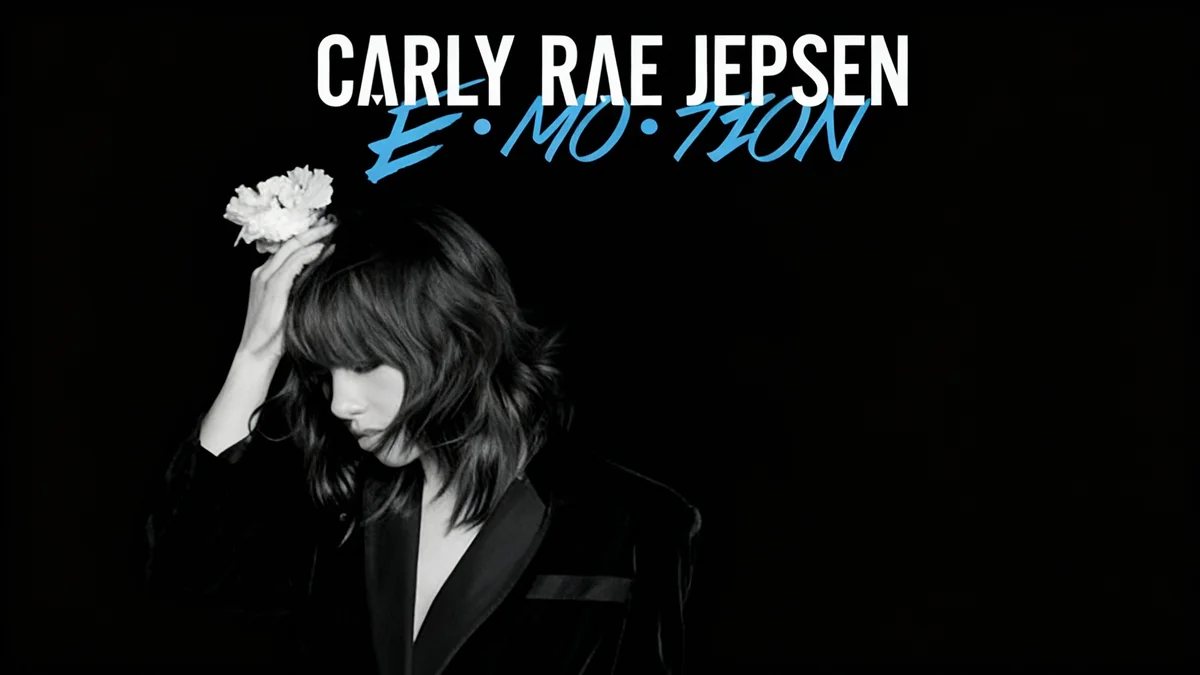Carly Rae Jepsen's acclaimed album, E•mo•tion, has reached its 10-year milestone, celebrated with a deluxe anniversary edition. Released in 2015, the album was a significant moment for the pop artist, showcasing her ambition to expand the boundaries of pop music. This re-release brings back the original tracks alongside bonus material, reaffirming the album's lasting impact.
Key Takeaways
- E•mo•tion 10th Anniversary Edition released, featuring original album and bonus tracks.
- The album marked a shift in Jepsen's sound towards glossy, 80s-inspired pop.
- It received significant critical praise, especially from music journalists.
- Despite critical success, the album did not achieve major commercial chart domination.
- Bonus material includes previously unreleased songs and remixes.
A Decade of Pop Evolution for Carly Rae Jepsen
In the summer of 2015, Carly Rae Jepsen articulated her artistic direction: she wanted to explore the full potential of pop music. This ambition followed the widespread success of her hit single, "Call Me Maybe," from the album Kiss. Jepsen's new musical approach moved into a more polished, retro style. This included elements like gated drums, prominent synthesizers, and occasional saxophone solos.
While 80s-inspired pop is common today, it felt like a fresh and bold choice a decade ago. Embracing the emotional and sometimes sentimental aspects of that era represented a surprising artistic shift for many. E•mo•tion became the cornerstone of this new direction.
Album Fact
Carly Rae Jepsen reportedly worked on over 200 songs during the creation of E•mo•tion, a testament to her dedication to the project.
The Unapologetic Pleasure of E•mo•tion
Jepsen has consistently challenged the idea that pop music should be considered a "guilty pleasure." E•mo•tion embodies this philosophy, offering pure, unselfconscious enjoyment. The album is characterized by its effervescent quality and lack of irony. Its songs focus on significant emotions, supported by high-quality production. This commitment to pure pop is evident in the uptempo rhythms, precise structures, and memorable hooks.
The lyrics, while not always complex, resonate immediately with listeners. For instance, "Run Away With Me" captures the feeling of invincibility that often comes with a new crush. "Boy Problems" features a vibrant bassline, 'na na na' choruses, and sharp percussion, evoking the energy of enthusiastic communication.
"My desire now is to see how far I can stretch pop."
Even tracks that deviate from the typical energetic pop formula are rewarding. "Warm Blood" offers a more contemplative, breathy sound, while the ballad "All That" expands Jepsen's sonic palette without distracting from the album's core identity. These songs demonstrate Jepsen's ability to explore different moods within her pop framework.
Exploring Themes of Love and Uncertainty
Carly Rae Jepsen's music often excels in moments of emotional ambiguity. Her best songs frequently explore feelings of uncertainty and indecision. The album's tracklist navigates various stages of relationships: almost-love, tentative breakups, intense crushes, and conflicted farewells. On tracks like "Your Type" and "Gimmie Love," Jepsen expresses a strong desire to move beyond friendship into romance. Conversely, "When I Needed You" portrays the struggle of letting go of a past relationship.
Jepsen's vocal delivery consistently conveys sincerity and dedication, which adds to her vibrant persona. She once mentioned using vaping to add a rasp to her voice for "Your Type," yet her sound remains undeniably sweet. Her lyrics sometimes feature unusual phrases, such as "Here I come to hijack you" or "Who gave you eyes like that/Said you could keep them?" Despite their unconventional nature, she delivers them with conviction, making them believable.
Background on Pop Music
The mid-2010s saw a growing movement known as "poptimism" in music criticism. This trend encouraged taking pop music seriously, viewing it as a legitimate art form rather than a mere commercial product. E•mo•tion arrived during a peak period for this critical perspective.
The Anniversary Edition: New and Familiar Tracks
The 10th anniversary edition of E•mo•tion includes the original 11 tracks. Additionally, it features six bonus tracks that were part of various previous deluxe editions. Among these is the song "Cut to the Feeling," a track initially written for the album but released in 2016 for a Canadian-French animated film. It is important to note that this anniversary edition does not overlap with E•mo•tion: Side B, which was the first in Jepsen's series of companion albums.
The new material on this release includes two remixes of "Run Away With Me." One is a fluid version by Kyle Shearer, and the other is a larger, stadium-ready mix by Rostam. Furthermore, four previously unreleased tracks are part of the package. Jepsen stated she recorded more than 200 songs for E•mo•tion. While these newly revealed tracks are characteristic of her style, their exclusion from the original album becomes clear upon listening. "More" has a sound similar to Disco Sweat, an album Jepsen recorded and then discarded after E•mo•tion, during a period influenced by ABBA. She believes Disco Sweat "will probably never be released, and shouldn’t." Other tracks like "Guardian Angel" and "Back of My Heart" are considered somewhat too charming, while "Lost in Devotion" is a less impactful ballad. Despite this, fans hoping for more E•mo•tion-era material will find these additions satisfying.
Production Choices and Critical Reception
Jepsen collaborated with many producers during the creation of E•mo•tion. Notably, big names like Max Martin and Jack Antonoff did not make the final cut. According to Jepsen's manager, Scooter Braun, the goal for E•mo•tion was not to chase hit singles. Instead, the focus was on creating a critically acclaimed album. Braun stated in 2015, "We had the biggest single in the world last time and didn’t have the biggest album. This time we wanted to stop worrying about singles and focus on having a critically acclaimed album."
The producers and co-writers Jepsen ultimately worked with—including Ariel Rechtshaid, Dev Hynes, Rostam Batmanglij, and Daniel Nigro (before his work with Olivia Rodrigo and Chappell Roan)—had different reputations. They were known for blending underground and pop sensibilities for artists such as Haim, Solange, and Sky Ferreira. This choice of collaborators likely contributed to the significant critical anticipation surrounding E•mo•tion.
The album received widespread praise from music journalists. While major publications at the time did not review commercially successful albums like Taylor Swift's 1989, E•mo•tion was not only reviewed but also had one of its songs designated "Best New Track." Another song was the subject of a lengthy 1300-word roundtable discussion. This level of critical attention was unusual for a major-label pop record a decade ago.
Critical Acclaim
One song from E•mo•tion was named "Best New Track" by a prominent music publication, and another inspired a 1300-word roundtable discussion among critics.
Shaping a Unique Pop Career Path
Despite the critical enthusiasm, E•mo•tion did not turn Jepsen into a global superstar in terms of chart performance. "I Really Like You" was her last song to reach the Billboard Hot 100, and the album peaked at No. 16. None of her subsequent albums have surpassed this chart position. While Jepsen aimed to push the limits of pop music, her career trajectory diverged from the mainstream chart-topping path taken by other artists in the last decade, who incorporated diverse global sounds and unexpected crossovers.
However, Jepsen did redefine what a pop career could be. E•mo•tion marked her transition into a different kind of star, riding the wave of poptimism into what some might call pop's middle class. She helped establish a model where strong support from online fans could sustain a career, becoming a precursor to artists who thrive with dedicated niche audiences. The album's commercial performance gave her an underdog status, fostering a fiercely loyal fanbase. Her later releases, while appreciated, have not quite captured the same vibrant essence as E•mo•tion.
Listening to E•mo•tion today, it does not feel like a relic of a past musical trend. Nor does it sound like a prophetic vision or the work of an indie darling. Instead, it stands as one of the most significant pop albums of the 21st century—a truly enjoyable and unpretentious musical experience.




